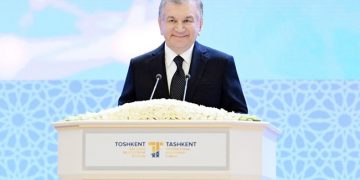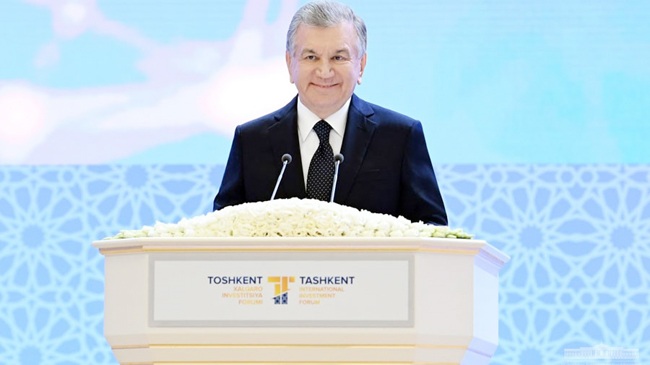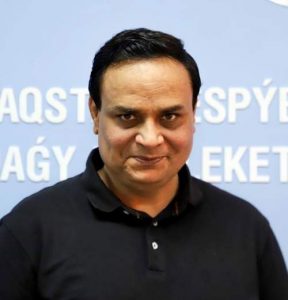Dr. Mehmood Ul Hassan
Director: The Center for South Asia and International Studies (CSAIS), Islamabad Regional Expert: Uzbekistan & CIS
Foreign Direct Investments (FDIs) has become real engine of economic stability and sustainability. Undoubtedly, modern economics has been fueled with inflows of FDIs around the globe. In this context, most recently, the first Tashkent International Investment Forum was held in Tashkent, Uzbekistan which achieved a resounding success.
The Forum was convened under the theme “Realizing New Growth Agenda” and targets which brought over 2000 leaders from government, business, civil society, media and academia to discuss and shape regional as well as industry agendas. More than 40 events were held within the framework of the forum, including a plenary session and industry meetings, round tables, presentations, briefings and others.
During the three days (March 24-26 2022) international event the investment potential of Uzbekistan was presented to the international investment and business communities. Interestingly, larger numbers of Pakistani investors, businessmen and companies were rigorously participated in the said forum.
The Forum was aimed at attracting the leaders of major foreign investment, financial and economic organizations and companies interested in integrating into the dynamically developing market of Uzbekistan. Minister of State and Chairman Board of Investment Muhammad Azfar Ahsan attended this prestigious forum and participated in several high level trilateral meetings.
The Chairman BOI met with various high officials and also interacted with potential investors from many countries as head of delegation from Pakistan for B2B meetings.
The President of Uzbekistan Shavkat Mirziyoyev, the President of the European Bank for Reconstruction and Development Odile Renaud-Basso, President of the Asian Development Bank Masatsugu Asakawa, Minister of Investment of the Kingdom of Saudi Arabia Khalid Al-Falih, Deputy Director-General of the World Trade Organization Xiangchen Zhang, Vice President of the Asian Infrastructure Investment Bank Konstantin Limitovsky and Senior Vice President of the International Finance Corporation Stephanie von Friedeburg attended the said forum.
The President of Uzbekistan Mirziyoyev welcomed the forum participants and delivered a keynote speech, covering series of structural reforms, meaningful business/investments friendly policies, mega projects of socio-economic transition & transformation and holistic initiatives pertaining to macro-economy of Uzbekistan having immense potential and opportunities of future investments and joint ventures in diverse sectors of economy. He showcased complete phases of reforms and transformations carried out in the country over the past few years, as well as outlined priority areas for its further development.
In his historic speech the President Mirziyoyev rightly projected Uzbekistan’s rich culture, traditions, civilization, hospitality and last but not least unforgettable inventions and discoveries vital for human survival, economic development, greater socio-economic integration and science & technology.
Uzbekistan the land of human wisdom, knowledge, commerce, connectivity, community development and the center of the Great Silk Road remained ideal destination for merchants, businessmen and entrepreneurs of different regions of the world since ancient times. It remained connecting hub for the continents of Asia, Europe and Africa. Thus president Mirziyoyev purposefully highlighted real economic potential of the country by connecting the past with present (based on the principle of “From the great past to the great future”) with lots of future health and productive prospects.
Rigorously structural reforms were introduced and implemented in 2017 and consequently, restrictions on the conversion of foreign currency and the repatriation of profits by foreign investors were relaxed and ultimately lifted. Moreover, Uzbekistan banks and large enterprises received international ratings and entered the global financial markets which actually changed the financial outlook of the country, he added.
The government of Uzbekistan upheld highest levels of openness, transparency and accountability to the international community, by introducing visa-free access for citizens of 90 foreign countries, while citizens of another 60 countries were allowed to obtain a visa in a simplified manner. Afterwards, Uzbekistan has achieved the status of the most open state in the region.
During his tremendous speech, the President Mirziyoyev waged a systematic work in combating corruption and ensuring the protection of citizens’ rights and freedoms. In this regard, in 2020, Uzbekistan adopted a National Human Rights Strategy, and for the first time in history, Uzbekistan was elected a member of the UN Human Rights Council.
According to head of the state, a grand success was achieved in building a civil society, ensuring freedom of speech, supporting the activities of media, ensuring the protection of labor rights and the development of human capital at regional as well as international level.
Keeping in view, the importance of qualitative education, more than 21 thousand new education institutions for schoolchildren have been created in the country over the past 5 years, about 200 new schools have been built, about 3 thousand schools have been reconstructed and fully equipped.
In the same short period, 82 new universities and institutes were created, including 23 foreign universities, and the total number of higher education institutions reached 159. The level of enrollment of school graduates in higher education has increased from the previous 9 to 28 percent.
Moreover, more focus was given to greater economic facilitations and liberalization due to which easing the tax burden, reducing customs duties, improving tax administration, systemic measures for the development of entrepreneurship and improving the investment climate were streamlined and systemically relaxed and incentivized.
Resultantly, the volume of annual foreign investments attracted to the country’s economy has tripled. Their total volume over the past 5 years has amounted to $25 billion. At the same time, about 59 thousand investment projects were implemented, due to which more than 2.5 million new jobs were created.
The President Mirziyoyev pinpointed strategic importance, scope, utility and value of the key priorities of the New Uzbekistan Development Strategy for 2022-2026, comprising the constant policy response to ensure economic and political stability, the creation of a compact and highly efficient public administration system focused on supporting business. It outlined reduction of the state’s share in the economy by stimulating entrepreneurial activity and ensuring the protection of investors’ rights. Additionally, it accelerated development and modernization of infrastructure, stimulating the production of high-value-added products based on local raw materials, investing in human capital, liberalizing foreign trade and ensuring gender equality.
Hopefully, due to multiplier effects of all these structural reforms the gross domestic product will reach $100 billion, and annual exports will increase by 2 times and exceed the figure of $30 billion. Furthermore, the share of the private sector in GDP will be increased to 80 percent. By 2030, Uzbekistan promises to become a country with incomes of citizens above the average level.
The Head of the state promised to further consistent work to create the most comfortable and attractive conditions for investors and comprehensively deepen mutually beneficial partnerships with foreign partners and international organizations.
To conclude, I suggest that because of emerging socio-economic, geopolitical and geostrategic scenarios, Uzbekistan should accelerate doable ideas to promote inter-regional trade through enhanced connectivity and liberalization of economy by providing suitable and befitting investments and business friendly policies and incentives. In this regard a specific “Regional National Air Carrier” would be value addition to increase volumes of imports & exports within the region.
I suggest that the government should give more focus to e-commerce, digitalization and artificial intelligence cooperation within the region so that unseen viruses may not derail economic growth in the future.
Since there is an urgent need to transform energy sector of Uzbekistan, preferential agreements should be signed, pursued and implemented with Kazakhstan, Turkmenistan and Pakistan for the further diversification of energy resources, transiting and transforming from fossil to green renewables.
Climate change is still uncontrolled and unresolved threat to Uzbekistan and rest of the region. It has certain stresses and strains on socio-economic development too. Thus there is an urgent need to jointly and collectively work for elimination of this looming threat in the region and beyond.
The investment, trade-economic and industrial potential of Uzbekistan should be projected through holding of various road shows in the regional and global capitals on regular basis. In this connection, prospects for the development of regional and global trade relations, mechanisms for attracting investment, trade liberalization and improving the competitiveness of the national economy should also be highlighted by involving national, regional as well as international mass media. Sincere efforts should be made to form corridors of knowledge with regional countries.
I suggest that further steps should be taken to industrialize the country through innovations and value additions. Further transformation of domestic energy and the transition to alternative energy sources and strengthening the transport connectivity of the countries of the region should be immediately chalked out. In this connection, transit potential of all the regional countries should be analyzed.
I suggest that policy makers and economic managers of Uzbekistan should prepare a doable comprehensive policy and road map to restoring and stimulating the accelerated development of economic activity in the post-COVID period. Reduction of poverty, generation of new jobs, regulation of monetary policy, supporting business, developing the banking sector and the financial market should be mantra of Uzbek government in which Islamic banking, further development of SMEs, Micro-financing and economics of humanity would play a decisive role in the days to come.
There is an urgent need to further streamline and strengthen national economic management, overhauling of public financial management, and improvement in the state-owned enterprises.
In this context, “Power Sector Reform Program” must be further transformed. The mortgage market reforms should be further improved through access to long-term market-based funding, competitive housing finance products, and better targeted housing subsidies in the country.
I suggest that government of Uzbekistan should accelerate the transition to a market economy while maintaining macroeconomic stability. Thus the role of the government, including reducing state involvement in financial intermediation should be channelized. So role of public private partnerships can play an important role.
To conclude, the government of Uzbekistan should further explore areas of trilateral cooperation among Uzbekistan, Pakistan and Afghanistan through befitting investments, joint ventures, PTAs, FTAs, reciprocal trade houses, formation of special economic zones, clubbing of potential of BRI & CPEC, facilitation of utilizing seaports, digitalization of transport systems, attracting Investments in tourism sector, production modernization and new agricultural markets should be the way forward. The proposed railway line track from Termez-Mazar-e-Sharif-Kabul Peshawar should be initiated as soon as possible.






